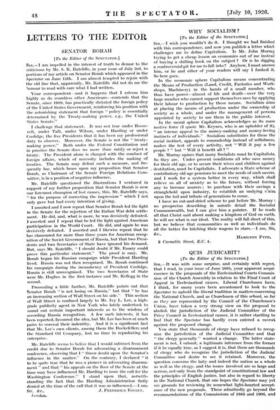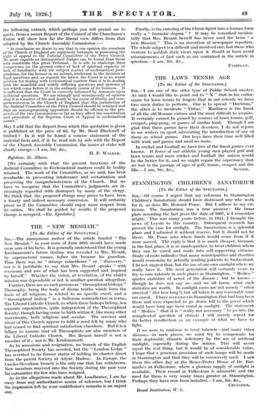QUIS JUDICABIT ?
LTo the Editor of the SPECTATOR.] SIR,--It was with some surprise, and certainly with regret, that I read, in your issue of June 26th, your apparent acqui. escence in the proposals of the Ecclesiastical Courts Commis. sion of the Church Assembly in relation to the Final Court of Appeal in Ecclesiastical causes. Liberal Churchmen have, I think, for many years been accustomed to look to the Spectator to uphold the liberal tradition in matters concerning the National Church, and as Churchmen of this school, so far as they are represented by the Council of the Churchmen's Union, have taken a very strong view on the proposal to abolish the jurisdiction of the Judicial Committee of the Privy Council in Ecclesiastical causes, it is rather startling to find that the Spectator has hardly even entered a caveat against the proposed change.
You state that thousands of clergy have refused to recog- nize the jurisdiction of the Judicial Committee and that "the clergy generally" wanted a change. The latter state- ment is not. I submit, a legitimate inference from the formee if it be equally true, as I suggest it is, that there are thousande of clergy who do recognize the jurisdiction of the Judicial Committee and desire to see it retained. Moreover, the question concerns the laity and indeed the nation as a whole as well as the clergy, and the issues involved are so large and serious, not only from the standpoint of constitutional law and the principles of English justice, but also in regard to liberty in the National Church. that one hopes the Spectator may yet see grounds for reviewing its somewhat light-hearted accept- ance of the new proposals. These admittedly go beyond the recommendations of the Commissions of 1883 and 1906, and the following extract, which perhaps you will permit me to quote, from a recent Report of the Council of the Churchmen's Union will show how far the liberal view differs from that adopted by the Church Assembly Commission :—
" In conclusion we desire to say that in our opinion the members of the Church of England are supremely fortunate in possessing the right of appeal to the Judicial Committee of the Privy Council. No more capable or distinguished Judges can be found than those who constitute this great Tribunal. It is idle to challenge their competence on the ground either of lack of spiritual capacity or lack of familiarity with the subject matter of ecclesiastical juris- prudenoe, for the former is, we submit, irrelevant to the decision of legal questions and, as regards the latter, the Court is in no worse position for dealing with ecclesiastical matters than it is in dealing with the manifold and widely differing questions and systems of law which come before it in the ordinary course of its business. It is sufficient that the Court be correctly informed by Assessors upon technical questions. We are strongly and unanimously of opinion that it is a matter of life and death to the cause of liberty and com- prehensiveness in the Church of England that this jurisdiction of the Judicial Committee of the Privy Council should be retained and that an uncompromising opposition should be offered to the pro- posals of the two Commissions so far as they affect the constitution and procedure of the Supreme Court of Appeal in ecclesiastical causes."
May I add that the Report from which this quotation is given is published at the price of 6d. by Mr. Basil Blackwell of Oxford ? In it will be found a concise statement of the material facts and, if it be read side by side with the Report of the Church Assembly Commission, the issues at stake will clearly emerge.—! am, Sir, &c., Rylstone, St. Albans.
H. F. WALKER.
[We certainly wish that the present functions of the Judicial Committee in Ecclesiastical matters could be bodily retained. The work of the Committee, as we said, has been invaluable in preventing intolerance and sectarianism and preserving the comprehensiveness of the Church. But we have to recognize that the Committee's judgments are in- creasingly regarded with disrespect by many of the clergy. We think that the proposed change may prove to have been a timely and indeed necessary concession. It will certainly prove so if the Committee should enjoy more respect from its critics. We shall be guided by results if the proposed change is accepted.—En. Spectator.]











































 Previous page
Previous page